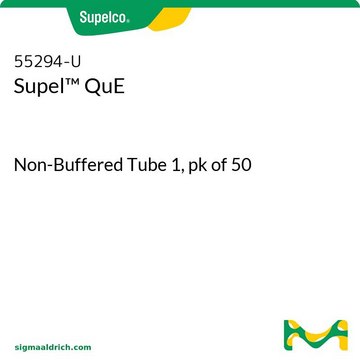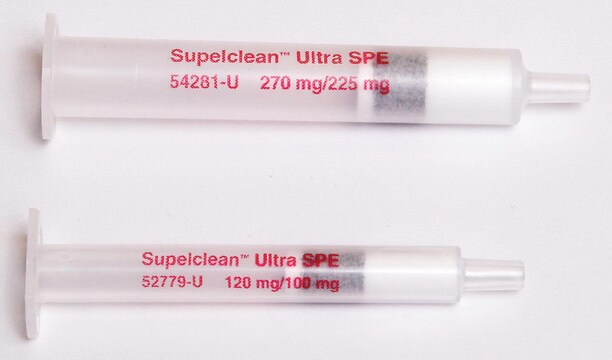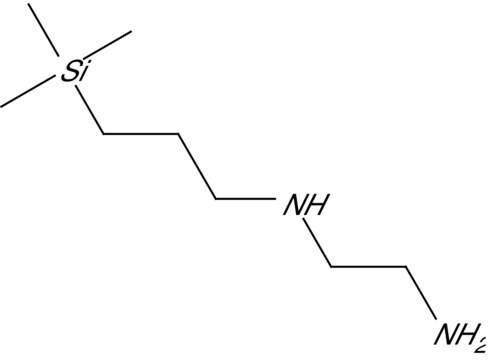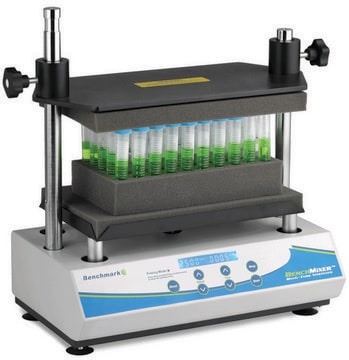55248-U
Supel™ QuE
Empty Centrifuge Tube with Lid, centrifuge tube volume 50 mL, pk of 50, suitable for EN 15662:2008 per BS
Synonym(s):
QuEChERS
About This Item
Recommended Products
Agency
AOAC® 2007.01
suitable for BS EN 15662:2008
composition
empty tube (n/a)
packaging
pk of 50
technique(s)
QuEChERS: suitable
centrifuge tube volume
50 mL
application(s)
food and beverages
Looking for similar products? Visit Product Comparison Guide
General description
Using the QuEChERS method, food/agricultural samples are first extracted with an aqueous miscible solvent (e.g., acetonitrile) in the presence of high amounts of salts (e.g., sodium chloride and magnesium sulfate) and/or buffering agents (e.g. citrate) to induce liquid phase separation and stabilize acid and base labile pesticides, respectively. Upon shaking and centrifugation, an aliquot of the organic phase is subjected to further cleanup using SPE. Unlike traditional methods using SPE tubes, in dispersive SPE, cleanup is facilitated by mixing bulk amounts of SPE (e.g., Supelclean PSA, ENVI-Carb, and/or Discovery DSC-18) with the extract. After sample cleanup, the mixture is centrifuged and the resulting supernatant can either be analyzed directly or can be subjected to minor further treatment before analysis.
Supelco carries a line of vials and centrifuge tubes containing pre-determined amounts of salts and SPE sorbents to support the most common method configurations used today.
Application
Legal Information
Application
Storage Class Code
13 - Non Combustible Solids
WGK
WGK 3
Flash Point(F)
Not applicable
Flash Point(C)
Not applicable
Choose from one of the most recent versions:
Certificates of Analysis (COA)
Sorry, we don't have COAs for this product available online at this time.
If you need assistance, please contact Customer Support.
Already Own This Product?
Find documentation for the products that you have recently purchased in the Document Library.
Customers Also Viewed
Articles
Compared to conventional PSA/C18/GCB cleanup, cannabis extracts cleaned with the Supel QuE Verde mixture showed lower GC/MS background, and better recoveries for many pesticides.
Extraction of Permethrin Pesticides from Spinach Using QuEChERS Methodology with Automated Shaking
Glyphosate and related compounds are measured in oatmeal and infant cereal using ion-exchange polymer-based particles for HPLC and SPE. Low level detection was obtained.
Determination of Neonicotinoids in Honey using a Chromolith RP-18 HPLC column and UV Detection
Protocols
A highly selective and sensitive analytical method was developed for chloramphenicol using a QuEChERS type sample preparation approach and LC-MS/MS detection.
Extraction and Analysis of Neonicotinoid Pesticides from Flower Blossoms Using Supel™ QuE and Ascentis® Express
Potency testing in marijuana-infused edibles is an important problem that analytical labs are facing due to the complexity of the involved matrices. Concentration of active ingredients in these edibles can range from a few parts per million to 3.5 parts per thousand. This application demonstrates the extraction and HPLC-UV analysis of the active compounds.
Determination of PAHs in Paprika Powder Using a Novel SPE Cartridge
Related Content
Supel QuE Z-Sep+ was successfully demonstrated for cleanup of beef kidney matrix, providing reduced background and less interference in the GC-MS analysis of the target pesticides
Chromatograms
application for HPLC, application for SPEsuitable for GC, application for SPEapplication for LC-MS, application for SPEapplication for HPLCShow MoreOur team of scientists has experience in all areas of research including Life Science, Material Science, Chemical Synthesis, Chromatography, Analytical and many others.
Contact Technical Service











